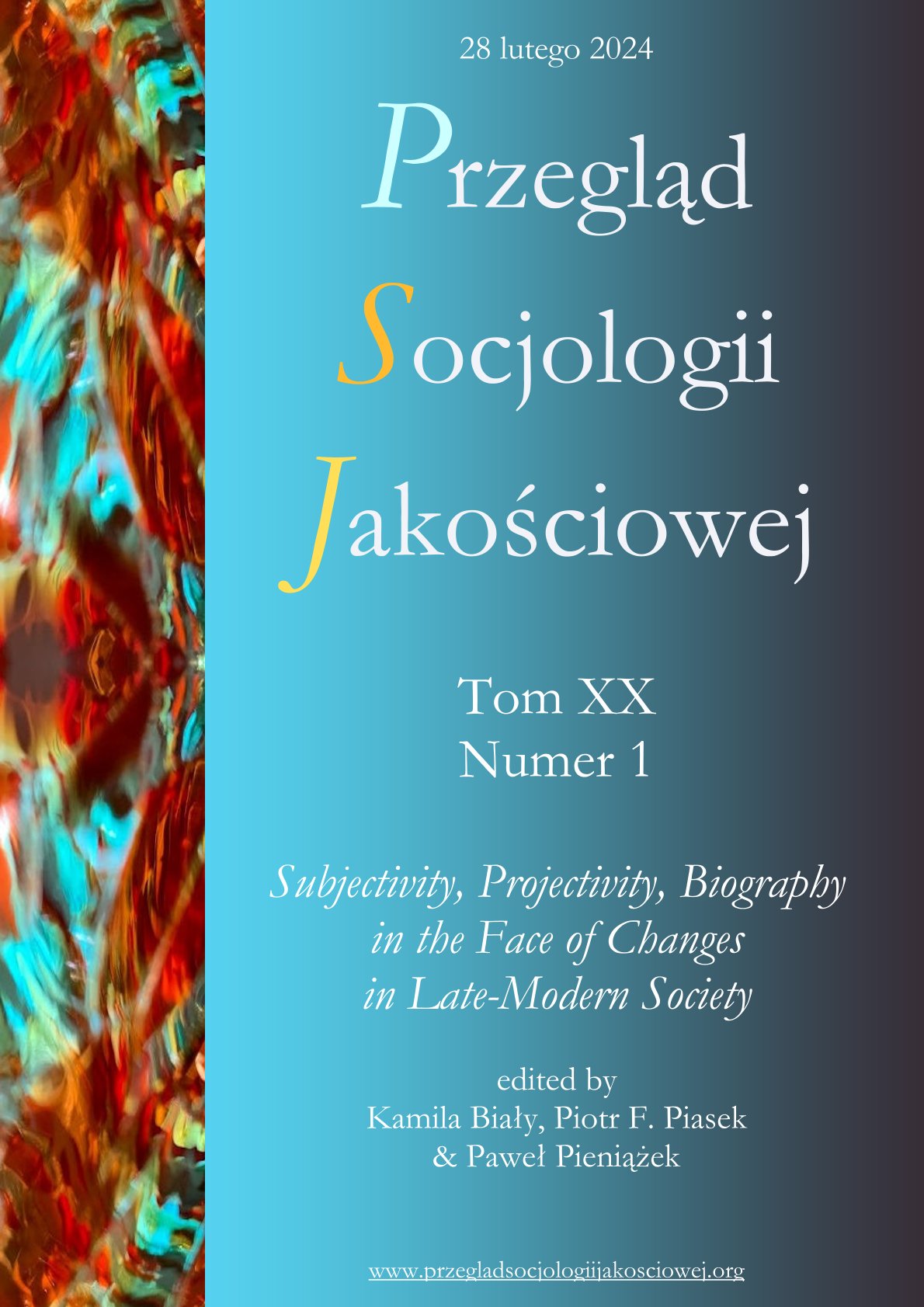Late Modern Individualization in Light of Critical Theory (the Frankfurt School): An Essay
DOI:
https://doi.org/10.18778/1733-8069.20.1.05Keywords:
modernity, late modernity, individualization, critical theory, change, productivityAbstract
The article describes the dialectic of the process of individualization in modernity and late modernity from the perspective of critical theory, particularly in its classical form (Frankfurt School). This dialectic consists in the transformation of individualization as a medium of emancipation into individualization understood not only as an ideology but most of all as a productive force of neoliberal capitalism, as a principle of its functioning. The article discusses the social-cultural determinants of this transformation, and subsequently the way in which late-modern individualism in the form of self-realization is functionalized by the market and subjected to the requirements of profit and efficiency in individual areas of economic and social life in the neoliberal world. The article refers to the methodology of qualitative sociology.
Downloads
References
Adorno Theodor W. (2019), Przemysł kulturalny, translated by Monika Bucholc, Warszawa: Narodowe Centrum Kultury.
Google Scholar
Baethge Martin (1991), Arbeit, Vergsellschaftung, Identität – Zur zunehmenden normativen Subjektivierung der Arbeit, “Soziale Welt”, vol. 42(1), pp. 6–17.
Google Scholar
Bauman Zygmunt (2000), Liquid Modernity, Cambridge: Polity.
Google Scholar
Bauman Zygmunt (2001), The Individualized Society, Cambridge: Polity.
Google Scholar
Bauman Zygmunt (2006), Społeczeństwo w stanie oblężenia, translated by Janusz Margański, Warszawa: Sic!
Google Scholar
Bauman Zygmunt (2007), Konsumenci w społeczeństwie konsumentów, Łódź: Wydawnictwo Uniwersytetu Łódzkiego.
Google Scholar
Bauman Zygmunt (2009), Konsumowanie życia, translated by Monika Wyrwas-Wiśniewska, Kraków: Wydawnictwo Uniwersytetu Jagiellońskiego.
Google Scholar
Beck Ulrich (1992), Risk Society. Towards a New Modernity, London: Sage Publications.
Google Scholar
Beck Ulrich (2002), Społeczeństwo ryzyka, translated by Stanisław Cieśla, Warszawa: Scholar.
Google Scholar
Bell Daniel (1976), The Cultural Contradictions of Capitalism, New York: Publishers.
Google Scholar
Bernstein Jay M. (2019), Wstęp, [in:] Theodor W. Adorno, Przemysł kulturalny, translated by Monika Bucholc, Warszawa: Narodowe Centrum Kultury, pp. 33–64.
Google Scholar
Biały Kamila, Haratyk Karol (2018), Outline of the Concept of Order-generating Dimensions: A Case of Hypermodernity in Polish Society of Late Capitalism, „Kultura i Społeczeństwo”, vol. 62(4), pp. 47–67.
Google Scholar
Biały Kamila, Piasek Piotr (2024), On social emergence. Non-dichotomous approach to qualitative data analysis, “Przegląd Socjologii Jakościowej”, vol. XX, no. 1, pp. 18–39.
Google Scholar
Birken Thomas (2012), Projektarbeit – arbeitssoziologisch gedeutet, https://www.researchgate.net/publication/288489694_Projektarbeit__arbeitssoziologisch_gedeutet (accessed: 14.04.2023).
Google Scholar
Paweł Pieniążek 100 ©2024 PSJ Tom XX Numer 1 Boltanski Luc, Chiapello Ève (2022), Nowy duch kapitalizmu, translated Filip Rogalski, Warszawa: Oficyna Naukowa.
Google Scholar
Bröckling Ulrich (2016), The entrepreneurial self. Fabricating a New Type of Subject, Los Angeles–London–New Delhi: Sage.
Google Scholar
Giddens Anthony (1991), Modernity and Self-Identity. „Self” and Society in the Late-Modern Age, Cambridge: Polity Press.
Google Scholar
Han Byung-Chul (2022), Społeczeństwo zmęczenia i inne eseje, translated by Rafał Pokrywka, Michał Sutowski, Warszawa: Wydawnictwo Krytyki Politycznej.
Google Scholar
Honneth Axel (2004), Organized Self-Realization. Some Paradoxes of Individualization, „European Journal of Social Theory”, vol. 7(4), pp. 463–478.
Google Scholar
Horkheimer Max, Adorno Theodore W. (1994), Dialektyka oświecenia. Fragmenty filozoficzne, translated by Małgorzata Łukaszewicz, Warszawa: Wydawnictwo IFiS PAN.
Google Scholar
Jacyno Małgorzata (2007), Kultura indywidualizmu, Warszawa: Wydawnictwo Naukowe PWN.
Google Scholar
Marcuse Herbert (1964), One-dimensional Man, London–New York: Routledge.
Google Scholar
Rosa Hartmut (2011), Beschleunigung und Depression – Überlegungen zum Zeitverhältnis der Moderne, „Psyche”, vol. 65, pp. 1041–1060.
Google Scholar
Rosa Hartmut (2012), Przyśpieszenie społeczne. Etyczne i polityczne konsekwencje desynchronizacji społeczeństwa wysokich wartości, „Ethos”, vol. 99(3), pp. 78–116.
Google Scholar
Rosa Hartmut (2020), Przyśpieszenie, wyobcowanie, rezonans. Projekt krytycznej teorii późnonowoczesnej czasowości, translated by Jakub Duraj, Jacek Kołtan, Gdańsk: Europejskie Centrum Solidarności.
Google Scholar
Sennett Richard (2006), Korozja charakteru. Osobiste konsekwencje pracy w nowym kapitalizmie, translated by Jan Dzierzgowski, Łukasz Mikołajewski, Warszawa: Wydawnictwo Literackie Muza SA.
Google Scholar
Simmel Georg (1980), Wolność i jednostka, translated by Sławomir Magala, [in:] Sławomir Magala, Simmel, Warszawa: Wiedza Powszechna, pp. 223–233.
Google Scholar
Stoll Dariusz (2017), Płynna nowoczesność a neoliberalizm. Wokół myśli Zygmunta Baumana, Warszawa: Instytut Wydawniczy Książka i Prasa.
Google Scholar
Published
Versions
- 2024-03-14 (2)
- 2024-02-28 (1)
How to Cite
Issue
Section
License

This work is licensed under a Creative Commons Attribution-NonCommercial-NoDerivatives 4.0 International License.














